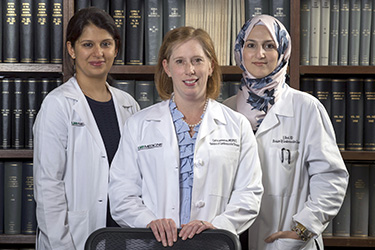 L to R: Garima Arora, MD (Assistant Professor, Cardiovascular Disease); Carrie Lenneman, MD (Associate Professor, Cardiovascular Disease); Riem Hawi, MD (Assistant Professor, Cardiovascular Disease)Since officially opening in January, the Cardio-Oncology Clinic has improved access for patients with cancer diagnoses, reducing the average wait time for a new appointment from 21 to nine days. The clinic’s primary goal is to provide cardio-protective treatment for patients during cancer treatment, which often involve therapies that can negatively impact cardiovascular function. Lead clinician Carrie Lenneman, MD (Associate Professor) is working with Garima Arora, MD (Assistant Professor) and Riem Hawi, MD (Assistant Professor), all from the Division of Cardiovascular Disease. Cardio-Oncology Clinics are held at both TKC and the VA.
L to R: Garima Arora, MD (Assistant Professor, Cardiovascular Disease); Carrie Lenneman, MD (Associate Professor, Cardiovascular Disease); Riem Hawi, MD (Assistant Professor, Cardiovascular Disease)Since officially opening in January, the Cardio-Oncology Clinic has improved access for patients with cancer diagnoses, reducing the average wait time for a new appointment from 21 to nine days. The clinic’s primary goal is to provide cardio-protective treatment for patients during cancer treatment, which often involve therapies that can negatively impact cardiovascular function. Lead clinician Carrie Lenneman, MD (Associate Professor) is working with Garima Arora, MD (Assistant Professor) and Riem Hawi, MD (Assistant Professor), all from the Division of Cardiovascular Disease. Cardio-Oncology Clinics are held at both TKC and the VA.
More Good News for May 9, 2018
The work of Nirav Patel, MD (Fellow, Cardiovascular Disease) was published in JACC: Heart Failure this month. His research presents a glimpse of what the future could look like for advanced heart failure care in the U.S. in view of the changing healthcare landscape and funding cuts.
Congratulations to Ankit Agrawal, MD (PGY-3) and Carlie Stein, MD (Assistant Professor, General Internal Medicine) whose work was recently published in the Journal of General Internal Medicine. In their article entitled “Exercises in Clinical Reasoning: Take a Time-Out and Reflect,” they discuss the diagnostic process of mentally highlighting key points from a case in order to create a focused differential diagnosis.
Congratulations to Mark Dransfield, MD (Professor, Pulmonary, Allergy and Critical Care) whose article, “Once-Daily Single-Inhaler Triple versus Dual Therapy in Patients with COPD” was published in the New England Journal of Medicine. With this trial, triple therapy inhalers resulted in a lower rate of COPD exacerbations and hospitalizations.
Min Xie, MD (Assistant Professor, Cardiovascular Disease) has received a Clinical and Translational Research (CSCTR) Award for his work entitled “HDAC inhibition-enhanced autophagy rescues mitochondrial function during cardiac ischemia/reperfusion injury.” FDA-approved anti-cancer histone deacetylase (HDAC) inhibitor, suberoylanilide hydroxamic acid (SAHA), was used and showed it can rescue the mitochondrial dysfunction after cardiac ischemia/reperfusion injury and reduce the infarct size.
German Henostroza, MD, Associate Professor, UAB Division of Infectious Diseases, will present “Global Health Day” at noon on Wednesday, May 16, in the Margaret Cameron Spain Auditorium.
Announcements:
The UAB Benevolent Fund School of Medicine Campaign is in full swing. Did you know that this year’s Community Impact Grant will support a unique project called Food Link that fosters healthy food access for uninsured patients in UAB PATH Clinic and Heart Failure Clinic? Patients, who screen positive for food insecurity, will receive fresh produce, healthy dry goods, and referrals to benefit programs and food pantries within the patient’s own community. You can support the UAB Benevolent Fund through payroll deductions or credit card gifts. Make a difference today!